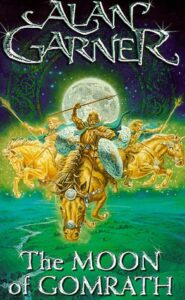 The Moon of Gomrath, Alan Garner
The Moon of Gomrath, Alan Garner
Flashback Friday review from 12th August, 2009
I liked this book better than the first book, The Weirdstone of Brisingamen. Maybe that’s because I’ve already had some of the world building from the first book and I know kind of what to expect, though. It was weird to me that it was a sequel, but it completely ignored the ending of the last book. There was virtually no reference to it at all, which is amazing considering the total lack of resolution I felt at the end. The only references are in a recurring enemy — the Morrigan — wanting revenge, and the fact that the characters are the same, plus the backstory about the sleepers in the cave.
The mythology in this one was interesting, anyway. I’m amused at how often the concept of the Wild Magic and the Wild Hunt comes up in fantasy books — here, in the Fionavar Tapestry, in The Dark Is Rising… I like it. The descriptions of Susan riding with them, and the way she gets left behind and feels both joy and anguish, are lovely.
Again, I felt a lack of resolution at the end of this book. Both books just end, with no reactions from the characters, nothing. Just. An end. It’s weird, I like things to be rounded off a little better. It’s not that they stop with big plot things left to happen, but they stop without making it feel satisfying.
It also feels like there should be more books in the series — you have all these comparatively little events, dealing with Grimnir and the Brollachan and the Morrigan, but throughout there’s the threat of Nastrond hovering over it, and the idea of the waking of the sleepers, but nothing happens with them. It feels like the focus is on the wrong thing. In one way it’s nice to have a big story hovering in the background, but when you know you’re never going to find out how that story resolves, it’s not so nice. There’s plenty of room for sequels, but I read that Alan Garner never intended for there to be another book. There’s so much that feels unfinished, though…
At least he didn’t write a shoddy page long epilogue in which we find out exactly what happened to everyone in as few words as possible.
This book is fun enough to just read, but I didn’t really get emotionally invested in it. Characters can die and I don’t really care. Not good!

Big klaxon warning: given your notes on resolution, DO NOT READ BONELAND.
*cough*
I mean, it’s gorgeous and intriguing, but it’s also impenetrable unless you have a thorough grounding in mediaeval literature (actually, you’d probably do a hella lot better with it than I did, thinking about it – my decent knowledge was nowhere near enough to pick up all the nuance). And it both answers a lot of questions and no questions, whilst breaking my heart by imposing such an adult response to my childhood favourites 😉 I enjoyed aspects of it, but I’m keeping it quite separate to my headcanon.
You’re on point though – at least Weirdstone has a resolution in so far as you know they’ve won, even if it closes on the grief of the victory; but Gomrath. Just. Stops. There’s so much left dangling.
Garner has latterly criticised both works heavily – not for the narrative arc, but for the mishmash of different types of myth, which is actually one of the reasons I always loved it. Britain is a mishmash of influences, so it felt right that adventures in the borders would reflect Welsh, Irish and Anglo-Saxon myths banging up against each other.
On that front, I’d be fine; my MA was medieval literature (and honestly, so was most of my BA)! I’m actually tempted to reread them all now that I do know more about it.
And I agree, the mix of mythologies makes total sense to me.
To say I enjoyed Boneland doesn’t quite cover it: it was so dense and complex, perplexing yet satisfying, utterly different and yet of a piece with the first two works. And yet I couldn’t bring myself to write a review straight away, so unlike my usual practice, deciding I needed a second read to give it the justice it deserves. My impression was that this was a self-revelatory almost confessional account that required a less trite approach than my reviews usually involved. I don’t know if any of this is any help to you!
I was uncomfortable with the mix of mythologies when I read the first two way back when; a recent reread suggested I was being too purist then though I’m still not totally won over.
Chris Lovegrove recently posted…Feeling festive
Hmm. You are making me very curious!